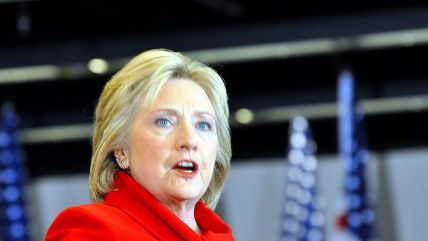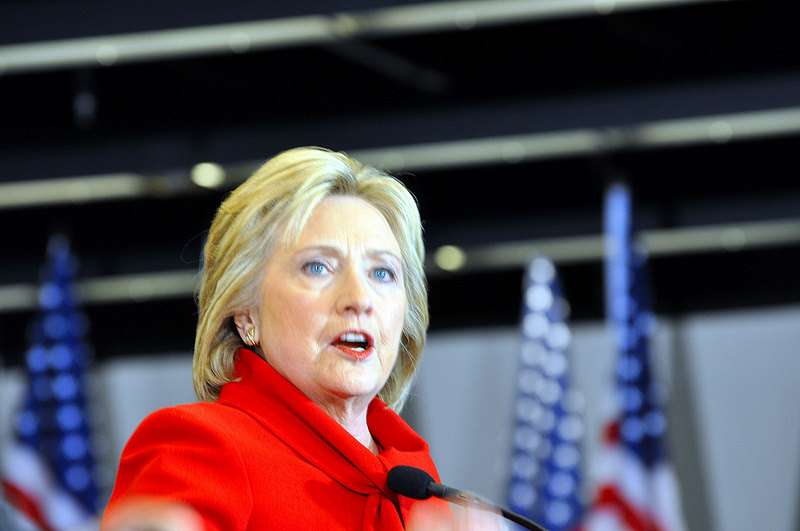Hillary Clinton's Struggles on Gay Issues Are About Her Honesty, Not Her Transformation
Her credibility is what's really in question, not when she actually came around.


Dan Savage is increasingly frustrated with those who want to continue to treat Hillary Clinton as though she's the same politician as the woman who once vocally campaigned against gay marriage recognition when she was running for Senate.
Savage, who is openly supporting both Clinton and Bernie Sanders as potential candidates, blogged that he is tired of those who want to hold Clinton to a standard of past ideological purity that is honestly not very reasonable given the history involved:
A lot of progressives are slamming Hillary for her past position on marriage equality and the rather noxious comments she made back then—which, again, are similar to the rather noxious comments made by most Dems at the time, including Barack Obama (who said the exact same shit, in fewer words)—and … they hammer and hammer away at it. And you know what? Most of the people I see out there hammering away at this—most of them, not all of them—are straight. Oh, there are queer folks doing it too. But it's mostly straight people and, man, are they losing their patience with queers who support Hillary. But straight or gay, here's what I have to say to those who can't understand why any gay person could possibly support Hillary over Bernie—or, like me, support Hillary and/or Bernie—when Bernie Always Had the Right Position On Marriage Equality and Hillary Used To Have the Wrong Position on Marriage Equality.
We're taking motherfucking yes for a motherfucking answer.
Hillary Clinton's support for marriage equality may be a political calculation. And you know what? We worked hard to change the math so that those political calculations would start adding up in our favor. So sincere change of heart or political calculation—either way—I will take it.
Savage is absolutely correct about the application of these weird purity tests when it comes to those who have come around to support gay issues. And they're not confined to Clinton. Whenever a political figure or celebrity or other public figure of any political leaning has announced a change of position toward gay marriage or supporting other gay issues, there is frequently an odd undercurrent of resentment expressed because they did not hold the correct position all along. There was, for example, Caitlyn Jenner, who was heavily criticized following an interview with Ellen DeGeneres last September where she admitted that, despite now openly identifying as transgender, she actually opposed gay marriage until more recently. She says she's on board now because she realizes that it's important to the people who want access to it (which is how a conservative comes to accept gay marriage), but somehow that wasn't enough of an endorsement for some folks.
Savage notes that this is not exactly the kind of attitude that encourages political transformation: "If pols who are currently on the wrong side of any of those issues see no benefit to changing their positions—if they see no political benefit—they're going to be harder to persuade. Why should they come around on our issues, why should they switch sides or change their votes, if we're going to go after them hammer and tongs for the positions they used to hold?"
But there's a larger issue with Clinton that Savage isn't addressing here: It's not whether Clinton's positions on gay issues are formed by political calculations now but rather whether they were formed by political calculations then, what that means for the promises she's making now, and how the way she talks about gay issues can be placed contextually into criticisms of her overall honesty.
For example, was Clinton's opposition to gay marriage a political calculation in the first place? Clinton insisted that 2013 that her position had "evolved," just like President Obama's. Statistician Nate Silver looked at the positions of other women from her demographic and political background and found that the vast, vast majority of them (potentially as high as 90 percent) were supporters of same-sex marriage recognition by 2008. Was Clinton an outlier back then? Or an opportunist?
Then there is the matter that she was caught out recently by leaders in the gay community attempting to mislead the public about why President Bill Clinton originally signed the Defense of Marriage Act (DOMA), which forbid federal recognition of same-sex marriage even when legally recognized by individual states. She is now attempting to claim that the reason President Clinton signed the legislation was to "protect" gays from a possible constitutional amendment in the works to ban same-sex marriage. But there was no amendment being discussed at the time at all. It simply wasn't true. Either the president actually opposed same-sex marriage recognition, or it was politically important for him to be on the record doing so.
As such, Clinton's positions on gay issues have to be considered not just on their own, but with the other issues of honesty and transparency that seem to be a top problem for her candidacy. Her many issues with the private e-mail server to conduct government business as secretary of state highlight problems with her honesty and her reluctance to be open and forthright (and I'm being diplomatic). Just last night she said she'll only release transcripts from her speeches to big banks if other candidates (including the Republicans) do, too.
Ignore the "Never read the comments!" web warning and read some of the replies to Savage. You'll see that the issue driving some progressive voters away from Clinton is not that she recently "evolved" on gay issues, but rather whether even progressive voters trust what she says. She has put out a lengthy agenda on LGBT issues that endorses every single item progressive community leaders want to happen, but if you don't see her as being honest, would you believe she's going to actually push for any of these things? (Not that I personally support most of the items on the agenda, which make a federal matter out of many issues that should be handled privately.)
Since Savage supports both Sanders and Clinton, one may well ask why he is even frustrated about the situation. After all, it's probably unlikely that Sanders' primary voters are going to turn around and vote for the Republican candidate should he fail to get the nomination. Rather, that Clinton is getting criticism for the same change of position over which Obama was heavily praised is a potential warning sign that she may have problem getting out voters who ran to the polls for Obama. There is a group of people on the left looking for reasons not to vote for Clinton, and they could just stay home come November. Her history on gay issues is really more of a symptom of the dislike, not the root cause. You can't take those issues out of the context of the other concerns about Clinton as a candidate and politician.


Show Comments (86)